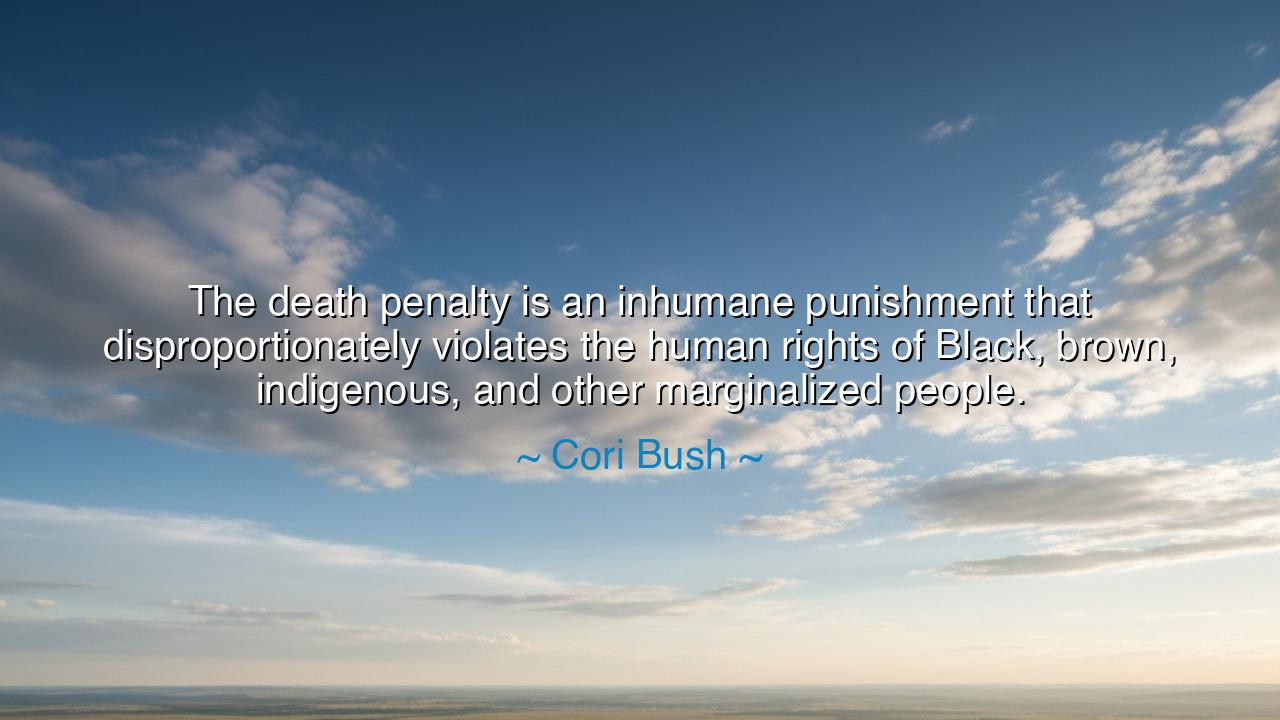
The death penalty is an inhumane punishment that
The death penalty is an inhumane punishment that disproportionately violates the human rights of Black, brown, indigenous, and other marginalized people.






The words of Cori Bush — “The death penalty is an inhumane punishment that disproportionately violates the human rights of Black, brown, indigenous, and other marginalized people.” — echo like a trumpet of conscience across the modern age. They are not words of anger alone, but of sorrow and moral clarity, born from centuries of injustice that have stained the fabric of human law. In them we hear the voice of one who has gazed upon suffering and dared to name its source: not only the cruelty of the death penalty itself, but the deeper cruelty of a system that wields it unequally — a system where the scales of justice are tipped by race, by poverty, by the long shadows of history.
Cori Bush, a leader, nurse, and activist, spoke these words as both a truth-teller and a witness. Her voice rises from the American struggle for equality, where the death penalty has been revealed time and again to be not an instrument of justice, but a weapon of bias. She speaks for those whose lives were taken not because their guilt was proven beyond doubt, but because their skin color, their poverty, or their origin made them more vulnerable to the harshest punishment the state can inflict. Her words carry the wisdom of generations who have cried for mercy in a world too quick to condemn.
To call the death penalty inhumane is to name it for what it is: a denial of the sacredness of life. It is the deliberate extinguishing of what no man has the right to take — the spark of being breathed into each person by creation itself. Across time, societies have justified it as justice, as deterrence, as order — yet it has most often served the powerful as a means of fear and control. In the modern age, we have learned what the ancients could not deny: that to kill in the name of justice is still to kill. And where the system that wields such power is unequal, its every judgment is suspect.
History bears grim witness to this truth. Consider the fate of George Stinney, a Black boy of only fourteen years, executed in South Carolina in 1944. His trial lasted barely two hours; the jury was all white; the evidence, none. He was so small that the electric chair had to be adjusted to fit his body. Decades later, he was proven innocent. His story is but one among thousands — the voices of the condemned, silenced not for their crimes, but for their color, for their poverty, for being born in a world that valued their lives less. It is this history — repeated in Black, brown, and Indigenous communities — that gives weight to Cori Bush’s cry for justice.
The ancients might have called such punishment hubris — the arrogance of mortals claiming divine authority. For who among us can measure the worth of another’s life? Who can say that redemption is impossible? Even in the old philosophies, the wise understood that justice must heal, not destroy. The philosopher Seneca wrote that mercy is the greatest virtue of the ruler, for power without mercy becomes tyranny. Cori Bush stands in this same lineage, calling upon a weary world to remember that vengeance does not cleanse — it corrodes. The death penalty, especially when born of prejudice, does not bring peace to the living; it merely multiplies the dead.
But her words also offer hope, for they remind us that awareness is the beginning of change. When she speaks of the marginalized, she does not seek pity, but solidarity. To end this inhumanity, one must first see it — not as an abstraction, but as a living wound in the body of society. Every citizen must ask: Who are we, that we preserve death when we could preserve life? Who are we, that our justice depends on the accident of birth or the color of skin? The answer, if it is to be righteous, must be found not in vengeance, but in compassion.
So, my children, take heed of this teaching. Do not mistake the death penalty for justice; it is the echo of an older cruelty that humanity must outgrow. Let your hearts be ruled not by the desire to punish, but by the courage to forgive. Support those who labor to reform the systems of power and law. Speak for the voiceless, for their silence condemns us all. And remember this eternal truth: that a society’s greatness is not measured by whom it executes, but by whom it uplifts. For where mercy reigns, justice breathes; and where compassion is practiced, humanity is reborn.






AAdministratorAdministrator
Welcome, honored guests. Please leave a comment, we will respond soon